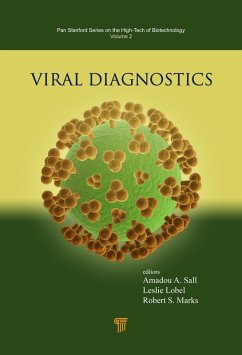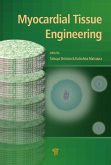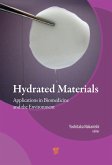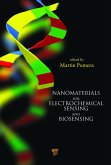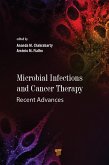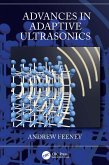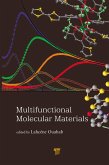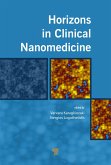Viral Diagnostics (eBook, PDF)
Advances and Applications
Redaktion: Marks, Robert S.; Sall, Amadou; Lobel, Leslie
100,95 €
100,95 €
inkl. MwSt.
Sofort per Download lieferbar

50 °P sammeln
100,95 €
Als Download kaufen

100,95 €
inkl. MwSt.
Sofort per Download lieferbar

50 °P sammeln
Jetzt verschenken
Alle Infos zum eBook verschenken
100,95 €
inkl. MwSt.
Sofort per Download lieferbar
Alle Infos zum eBook verschenken

50 °P sammeln
Viral Diagnostics (eBook, PDF)
Advances and Applications
Redaktion: Marks, Robert S.; Sall, Amadou; Lobel, Leslie
- Format: PDF
- Merkliste
- Auf die Merkliste
- Bewerten Bewerten
- Teilen
- Produkt teilen
- Produkterinnerung
- Produkterinnerung

Bitte loggen Sie sich zunächst in Ihr Kundenkonto ein oder registrieren Sie sich bei
bücher.de, um das eBook-Abo tolino select nutzen zu können.
Hier können Sie sich einloggen
Hier können Sie sich einloggen
Sie sind bereits eingeloggt. Klicken Sie auf 2. tolino select Abo, um fortzufahren.

Bitte loggen Sie sich zunächst in Ihr Kundenkonto ein oder registrieren Sie sich bei bücher.de, um das eBook-Abo tolino select nutzen zu können.
This book illustrates a variety of challenges that bug hunters try to solve. It is an outstanding collection of the insights and expertise of an interdisciplinary group of researchers from all walks of life: virologists, physicians, immunologists, electrochemists, physicists, computer scientists, biotechnologists, epidemiologists, and molecular bio
- Geräte: PC
- mit Kopierschutz
- eBook Hilfe
- Größe: 17.57MB
Andere Kunden interessierten sich auch für
![Myocardial Tissue Engineering (eBook, PDF) Myocardial Tissue Engineering (eBook, PDF)]() Myocardial Tissue Engineering (eBook, PDF)100,95 €
Myocardial Tissue Engineering (eBook, PDF)100,95 €![Hydrated Materials (eBook, PDF) Hydrated Materials (eBook, PDF)]() Yoshitaka NakanishiHydrated Materials (eBook, PDF)100,95 €
Yoshitaka NakanishiHydrated Materials (eBook, PDF)100,95 €![Nanomaterials for Electrochemical Sensing and Biosensing (eBook, PDF) Nanomaterials for Electrochemical Sensing and Biosensing (eBook, PDF)]() Nanomaterials for Electrochemical Sensing and Biosensing (eBook, PDF)100,95 €
Nanomaterials for Electrochemical Sensing and Biosensing (eBook, PDF)100,95 €![Microbial Infections and Cancer Therapy (eBook, PDF) Microbial Infections and Cancer Therapy (eBook, PDF)]() Microbial Infections and Cancer Therapy (eBook, PDF)121,95 €
Microbial Infections and Cancer Therapy (eBook, PDF)121,95 €![Advances in Adaptive Ultrasonics (eBook, PDF) Advances in Adaptive Ultrasonics (eBook, PDF)]() Andrew FeeneyAdvances in Adaptive Ultrasonics (eBook, PDF)81,95 €
Andrew FeeneyAdvances in Adaptive Ultrasonics (eBook, PDF)81,95 €![Multifunctional Molecular Materials (eBook, PDF) Multifunctional Molecular Materials (eBook, PDF)]() Multifunctional Molecular Materials (eBook, PDF)100,95 €
Multifunctional Molecular Materials (eBook, PDF)100,95 €![Horizons in Clinical Nanomedicine (eBook, PDF) Horizons in Clinical Nanomedicine (eBook, PDF)]() Horizons in Clinical Nanomedicine (eBook, PDF)100,95 €
Horizons in Clinical Nanomedicine (eBook, PDF)100,95 €-
-
-
This book illustrates a variety of challenges that bug hunters try to solve. It is an outstanding collection of the insights and expertise of an interdisciplinary group of researchers from all walks of life: virologists, physicians, immunologists, electrochemists, physicists, computer scientists, biotechnologists, epidemiologists, and molecular bio
Dieser Download kann aus rechtlichen Gründen nur mit Rechnungsadresse in A, B, BG, CY, CZ, D, DK, EW, E, FIN, F, GR, HR, H, IRL, I, LT, L, LR, M, NL, PL, P, R, S, SLO, SK ausgeliefert werden.
Produktdetails
- Produktdetails
- Verlag: Taylor & Francis
- Seitenzahl: 528
- Erscheinungstermin: 15. Dezember 2014
- Englisch
- ISBN-13: 9789814364447
- Artikelnr.: 42366015
- Verlag: Taylor & Francis
- Seitenzahl: 528
- Erscheinungstermin: 15. Dezember 2014
- Englisch
- ISBN-13: 9789814364447
- Artikelnr.: 42366015
- Herstellerkennzeichnung Die Herstellerinformationen sind derzeit nicht verfügbar.
Robert S. Marks earned his Ph.D. from the Weizmann Institute of Science and did his postdoctoral research at the University of Cambridge. He is a full professor at the Department of Biotechnology Engineering, the Ben-Gurion University of the Negev, Israel, and is affiliated to the National Institute for Biotechnology in the Negev and the Ilse Kats Centre for Nanotechnology. He is currently a program coordinator for the NRF CREATE program "Nanomaterials for Water and Energy Management" through MSE at the Nanyang Technological University. Prof. Marks has published in viral immunosensors and has extensive experience in biosensors. He has developed new sensor configurations, such as establishing diagnostics based on luminescence emitted by primed neutrophils, and is the editor-in-chief of the 2007 two-volume Wiley Handbook in Biosensors and Biochips as well as author of more than 100 papers and numerous chapters. Leslie Lobel earned his B.A., summa cum laude, in chemistry from Columbia College of Columbia University and attended the Medical Scientist Training Program at the College of Physicians and Surgeons of Columbia University, earning his M.D. and Ph.D. in 1988. He was awarded a Helen Hay Whitney Fellowship for postdoctoral training. After postdoctoral work in the laboratory of H. Robert Horvitz at MIT, he returned to the Department of Medicine at Columbia University before moving to the Department of Virology at Ben Gurion University, where he set up a laboratory of immunovirology and viral therapeutics in 2003. His work includes studies on the profile of the immune response to various viral diseases. Amadou Alpha Sall is a virologist and has a Ph.D. in public health. He received his scientific education in France at the universities Paul Sabatier, Toulouse, Paris-Sud, Orsay, and Pierre et Marie Curie, Paris. Currently he is the head of the Arboviruses and Viral Hemorrhagic Fever unit, director of the WHO collaborating center, and scientific director of Institut Pasteur de Dakar, which belongs to the Institut Pasteur International Network. His research focuses primarily on ecology and evolution of arboviruses and viral hemorrhagic fever. He has published more than 80 papers and book chapters and presented more than 100 scientific papers in international conferences. Dr. Sall is a recipient of the Senegal Presidential Award for Science and is a member of the Senegal National Academy of Science and Technology.
Foreword
Preface
1. Practical Experience with an Integrated Syndromic Surveillance System in the Medical
Veterinary
Nursing
and Emergency Respons
2. Environmental Surveillance for Polioviruses in Israel: Bioerror
Bioterror
or just Mother Nature
. 3. Filoviruses: Deadly Pathogens and Potential Bioweapons
4. Bridging Diagnostics Research
Development
and Commercialization: Diagnostics for the Developing World
5. Oropouche Fever: An Overview of the Epidemiological and Molecular Aspects in the Brazilian Amazon Region
6. Is Avian Influenza Subtype H5N1 a Cause for Concern? A Critical Analysis
7. Diagnostics of Viral Respiratory Diseases
8. Reverse Genetics as a Tool for Detection of Negative-Stranded RNA Viruses
9. Diagnostics of Ebola Hemorrhagic Fever Virus
10. Pathogen Detection Using Spatially Focused Microwaves and Metal-Enhanced Fluorescence
11. Lyssavirus Surveillance and Diagnostics: Focus on Africa
12. Detection of Human Pathogens under Basic Laboratory Conditions by DNA Hybridization Arrays
13. Differentiation between Viral and Bacterial Respiratory Infections Using Chemiluminescence of Polymorphonuclear Leukocytes
14. Phage Display for Viral Diagnostics
15. Nanolithography and Biochips' Role in Viral Detection
16. Optical Fiber Immunosensors and Genosensors for the Detection of Viruses
17. Aptamers
a New Class of Binders
with Particular Focus on Diagnostics and Bioactivity in the Field of Virology
18. Pseudotyped Viruses: A New Sero-Diagnostic Tool
19. Nucleic Acid Isothermal Amplification Technologies and Point-of-Care Diagnostics
20. Recent Ebola and Marburg Viral Hemorrhagic Fever Outbreaks in Uganda: The Need for Quick
Reliable Diagnostic Tests
21. Amperometric Immunoand DNA Sensors for Rapid and Specific Identification of Viruses
Preface
1. Practical Experience with an Integrated Syndromic Surveillance System in the Medical
Veterinary
Nursing
and Emergency Respons
2. Environmental Surveillance for Polioviruses in Israel: Bioerror
Bioterror
or just Mother Nature
. 3. Filoviruses: Deadly Pathogens and Potential Bioweapons
4. Bridging Diagnostics Research
Development
and Commercialization: Diagnostics for the Developing World
5. Oropouche Fever: An Overview of the Epidemiological and Molecular Aspects in the Brazilian Amazon Region
6. Is Avian Influenza Subtype H5N1 a Cause for Concern? A Critical Analysis
7. Diagnostics of Viral Respiratory Diseases
8. Reverse Genetics as a Tool for Detection of Negative-Stranded RNA Viruses
9. Diagnostics of Ebola Hemorrhagic Fever Virus
10. Pathogen Detection Using Spatially Focused Microwaves and Metal-Enhanced Fluorescence
11. Lyssavirus Surveillance and Diagnostics: Focus on Africa
12. Detection of Human Pathogens under Basic Laboratory Conditions by DNA Hybridization Arrays
13. Differentiation between Viral and Bacterial Respiratory Infections Using Chemiluminescence of Polymorphonuclear Leukocytes
14. Phage Display for Viral Diagnostics
15. Nanolithography and Biochips' Role in Viral Detection
16. Optical Fiber Immunosensors and Genosensors for the Detection of Viruses
17. Aptamers
a New Class of Binders
with Particular Focus on Diagnostics and Bioactivity in the Field of Virology
18. Pseudotyped Viruses: A New Sero-Diagnostic Tool
19. Nucleic Acid Isothermal Amplification Technologies and Point-of-Care Diagnostics
20. Recent Ebola and Marburg Viral Hemorrhagic Fever Outbreaks in Uganda: The Need for Quick
Reliable Diagnostic Tests
21. Amperometric Immunoand DNA Sensors for Rapid and Specific Identification of Viruses
Foreword
Preface
1. Practical Experience with an Integrated Syndromic Surveillance System in the Medical
Veterinary
Nursing
and Emergency Respons
2. Environmental Surveillance for Polioviruses in Israel: Bioerror
Bioterror
or just Mother Nature
. 3. Filoviruses: Deadly Pathogens and Potential Bioweapons
4. Bridging Diagnostics Research
Development
and Commercialization: Diagnostics for the Developing World
5. Oropouche Fever: An Overview of the Epidemiological and Molecular Aspects in the Brazilian Amazon Region
6. Is Avian Influenza Subtype H5N1 a Cause for Concern? A Critical Analysis
7. Diagnostics of Viral Respiratory Diseases
8. Reverse Genetics as a Tool for Detection of Negative-Stranded RNA Viruses
9. Diagnostics of Ebola Hemorrhagic Fever Virus
10. Pathogen Detection Using Spatially Focused Microwaves and Metal-Enhanced Fluorescence
11. Lyssavirus Surveillance and Diagnostics: Focus on Africa
12. Detection of Human Pathogens under Basic Laboratory Conditions by DNA Hybridization Arrays
13. Differentiation between Viral and Bacterial Respiratory Infections Using Chemiluminescence of Polymorphonuclear Leukocytes
14. Phage Display for Viral Diagnostics
15. Nanolithography and Biochips' Role in Viral Detection
16. Optical Fiber Immunosensors and Genosensors for the Detection of Viruses
17. Aptamers
a New Class of Binders
with Particular Focus on Diagnostics and Bioactivity in the Field of Virology
18. Pseudotyped Viruses: A New Sero-Diagnostic Tool
19. Nucleic Acid Isothermal Amplification Technologies and Point-of-Care Diagnostics
20. Recent Ebola and Marburg Viral Hemorrhagic Fever Outbreaks in Uganda: The Need for Quick
Reliable Diagnostic Tests
21. Amperometric Immunoand DNA Sensors for Rapid and Specific Identification of Viruses
Preface
1. Practical Experience with an Integrated Syndromic Surveillance System in the Medical
Veterinary
Nursing
and Emergency Respons
2. Environmental Surveillance for Polioviruses in Israel: Bioerror
Bioterror
or just Mother Nature
. 3. Filoviruses: Deadly Pathogens and Potential Bioweapons
4. Bridging Diagnostics Research
Development
and Commercialization: Diagnostics for the Developing World
5. Oropouche Fever: An Overview of the Epidemiological and Molecular Aspects in the Brazilian Amazon Region
6. Is Avian Influenza Subtype H5N1 a Cause for Concern? A Critical Analysis
7. Diagnostics of Viral Respiratory Diseases
8. Reverse Genetics as a Tool for Detection of Negative-Stranded RNA Viruses
9. Diagnostics of Ebola Hemorrhagic Fever Virus
10. Pathogen Detection Using Spatially Focused Microwaves and Metal-Enhanced Fluorescence
11. Lyssavirus Surveillance and Diagnostics: Focus on Africa
12. Detection of Human Pathogens under Basic Laboratory Conditions by DNA Hybridization Arrays
13. Differentiation between Viral and Bacterial Respiratory Infections Using Chemiluminescence of Polymorphonuclear Leukocytes
14. Phage Display for Viral Diagnostics
15. Nanolithography and Biochips' Role in Viral Detection
16. Optical Fiber Immunosensors and Genosensors for the Detection of Viruses
17. Aptamers
a New Class of Binders
with Particular Focus on Diagnostics and Bioactivity in the Field of Virology
18. Pseudotyped Viruses: A New Sero-Diagnostic Tool
19. Nucleic Acid Isothermal Amplification Technologies and Point-of-Care Diagnostics
20. Recent Ebola and Marburg Viral Hemorrhagic Fever Outbreaks in Uganda: The Need for Quick
Reliable Diagnostic Tests
21. Amperometric Immunoand DNA Sensors for Rapid and Specific Identification of Viruses
